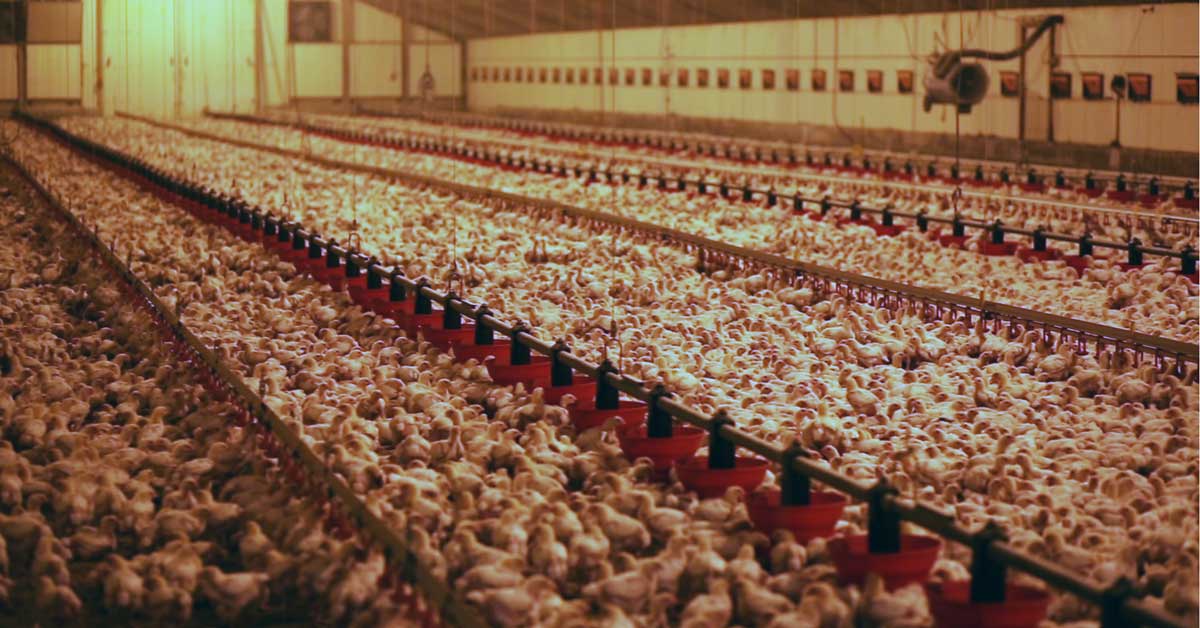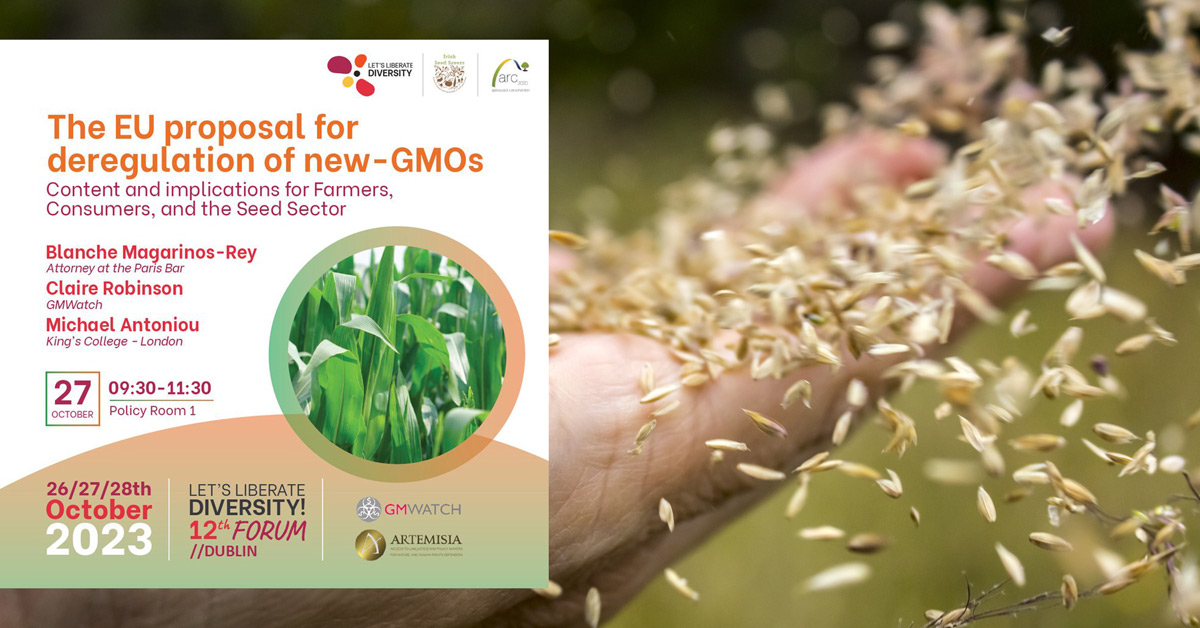| Welcome to Review 578, which covers the latest developments on new GMOs, including the push to remove regulatory safeguards from these products in the EU. And don’t forget to check out our RESOURCES ON NEW GMOs section at the end of this Review for links to more of the science that supports the need to subject gene-edited plants and animals to strict safety assessments. 
Scientists at the University of Edinburgh’s Roslin Institute — the animal research centre where Dolly the sheep was created — have used CRISPR gene editing to develop chickens that resist infection by bird flu, a disease that has decimated some wild bird populations and commercial poultry flocks across the world. But there are serious risks and limitations in the research, which were even indicated by the scientists involved but were largely ignored or downplayed by mainstream media outlets. In GMWatch’s view, the findings suggest that a single-gene approach to conferring robust viral resistance will never work, a multi-gene approach carries a high risk of creating serious health and welfare issues in the birds, and scientists are still very far from their goal of developing bird flu-resistant flocks through GM. The European Commission’s proposal to exempt most new GM plants from regulation lacks any scientific basis, according to scientists from the European Network of Scientists for Social and Environmental Responsibility (ENSSER). They say, “The proposal will expose citizens and the environment to potentially unsafe food, feed and plants without informing the citizens (about their presence in the food chain). It amounts to a shameful attack on the Precautionary Principle (PP). New GM plants must remain regulated by the existing EU legislation, which has proven to serve its purpose well.” Although the Commission claims that its proposal is based on science, ENSSER says the core of the proposal is merely criteria concerning the number and type of genetic modifications allowed and the length of DNA sequences involved. Yet there is no scientific basis to suggest that new GM plants meeting these criteria are biologically equivalent to conventional plants and should therefore be exempted from regulation, as the Commission proposes to do. ENSSER says these criteria are unscientific, arbitrary, and no more than a political classification. The basis of the EU Commission’s plan to deregulate new genomic — or gene-editing — techniques (NGTs) is “completely and utterly scientifically flawed,” molecular geneticist Professor Michael Antoniou told watchdog organisation Corporate Europe Observatory in recorded video interviews. Now the interviews with Prof Antoniou have featured in coverage by the EU's political news magazine Politico (subscription only; no link). Politico reports: “According to Antoniou, who works for King’s College London, the gene-editing process ‘not only is a completely artificial laboratory procedure but it’s also highly prone to unintended DNA damage’... Unintended DNA changes when trying to edit a genome can occur in many ways, the expert explained. These can cause many gene functions to change, which in turn can result in ‘dramatic changes in the biochemistry and the composition of the plant,’ such as new toxins or new allergens.” The Politico piece concludes with Prof Antoniou warning that these unintended consequences pose a major risk to public health, and saying the Commission’s proposal intentionally ignores the science because of a “strong industry”. The European Economic and Social Committee (EESC) acts in an advisory role to the European Parliament, Council, and Commission and is made up of employers, trade unionists and representatives of social, occupational, economic and cultural organisations. The EESC has issued a critical opinion on the EU Commission’s proposal to deregulate new GMOs. Notably, the EESC wants:
* some kind of labelling of Category 1 NGT (new genomic techniques or new GMOs) plants, including for the consumer. The Commission wants only to label seed and there is a proposal from within the Parliament to reject even that;
* EU-level regulation of co-existence to avoid different rules being applied by Member States (the Commission wanted to leave it to Member States to fight it out among themselves);
* the creation of a traditional European seed bank that would be GMO-free as insurance for food sovereignty;
* outlawing of do-it-yourself GMO/CRISPR kits for non-professionals to buy on the Internet;
* upholding of the precautionary principle (“as there is scientific uncertainty as to the global impact of NGTs”) and the principle of reversibility (“to reverse or mitigate any damage if the operations regulated by the Commission were to have negative effects”);
* a risk-benefit analysis applicable 10 years after the introduction of the new techniques.
The opinion rejects the Commission’s and industry’s position that new GMOs are equivalent to conventional plants, which it calls an “unrealistic simplification” based on the incorrect assumption that only the gene of interest is concerned. The EESC opinion also correctly points out that traces of foreign DNA are left behind in new GMOs and that unintentional mutations are not eliminated through back-crossing. 
Has the European Commission based its proposal to deregulate new GMOs/NGTs on “sound science” or on the demands of seed companies? Inf'OGM reports that documents obtained by Corporate Europe Observatory show that the Commission chose to listen to the companies rather than its own experts at the European Food Safety Authority (EFSA). EFSA had asked for an assessment – albeit a relatively light one – of the risks of new GMOs. However, the Commission instead has proposed abolishing this requirement, in line with the wishes of industry. When publishing its deregulation plan, the Commission unusually made very little reference to being guided by science. In an FAQ, though, the Commission does claim it has relied “on EU-level scientific advisory bodies”, including EFSA. Yet we now know that EFSA in fact recommended that new GMOs be risk assessed – advice that the Commission chose to ignore. The draft report of the rapporteur of the European Parliament’s Environment Committee is completely unacceptable, says ENGA (the European Non-GMO Industry Association), given its removal of the already negligible transparency for EU citizens in the European Commission’s proposal on new GMOs (NGTs). ENGA says, “The EP rapporteur’s draft report removes the only transparency requirement proposed by the European Commission for category 1 NGTs (about 94% of all new GMOs): The need to label seeds as NGTs. This means that the whole food production chain, starting with breeders and farmers, as well as food and feed processors, retailers and consumers, will be kept in the dark about new GMOs on the EU market. The Biodynamic Federation Demeter International, representing the biodynamic farming movement worldwide as part of the organic sector, also says it firmly opposes the direction taken by the rapporteur in the draft report: “The removal of the ban of Category 1 NGTs in organic farming and the seed labelling provisions are our main topics of concern. We urge the European Parliament to reinstate both provisions back in the final report.” Like Demeter International (above), IFOAM Organics Europe is strongly opposed to the changes proposed in the rapporteur’s report, demanding that the European Parliament maintain its ban on all new genomic techniques (NGTs, new GMOs) in organic farming. The European organic food and farming association is also worried about the seed labelling provisions that have been deleted in the draft report. Seed labelling provisions would have been a starting point for transparency at the breeding level and for farmers, the association said. Silvia Schmidt, policy manager at IFOAM, said, “Banning old and new GMOs in organic is crucial because organic and GMO-free operators should have the right to produce GMO-free”. 
On 27 October, GMWatch’s Claire Robinson joined lawyer Blanche Magarinos-Rey and molecular geneticist Prof Michael Antoniou in a presentation on the EU Commission proposal to remove safety checks, traceability and labelling from new GM foods, at the Let’s Liberate Diversity! conference on seed diversity in Dublin, Ireland. The presentation explained the content of the proposal and its implications for consumers, farmers, and the seed sector, including breeders, and ended with an explanation of why the proposal is not scientifically based and indeed runs counter to scientific findings on the risks of new GMOs. The presentation included recommendations on what concerned citizens and groups can do to oppose the Commission’s proposal. This involves writing to MEPS and demanding that safety checks, traceability requirements, and labelling are applied to all GMOs, both old and new. The event followed the publication of a detailed new report by Slow Food, “Deregulation of New GMOs in the EU: What would it mean for us?”, authored by GMWatch’s Claire Robinson with Slow Food's Madeleine Costa and Giulia Gouet. Both the slides for the presentation and the Slow Food report can be downloaded at the above link. In an excellent five-part series, food anthropologist Dr Lauren Crossland-Marr takes listeners into the labs where researchers are tinkering with food genes, to help break down the problems they’re hoping to solve – and what’s at stake. Interviewees include GMWatch’s Claire Robinson, molecular geneticist Prof Michael Antoniou, and developer of the Flavr Savr GM tomato and subsequently GMO critic, Dr Belinda Martineau. RESOURCES ON NEW GMOs Science supports need to subject gene-edited plants and animals to strict safety assessments Gene editing: Unexpected outcomes and risks Gene editing myths and reality – a guide through the smokescreen On-target effects of genome editing techniques: (Un)repaired DNA damage, a hindrance to safety and development? .................................................................. We hope you’ve enjoyed this newsletter, which is made possible by readers’ donations. Please support our work with a one-off or regular donation. Thank you! |